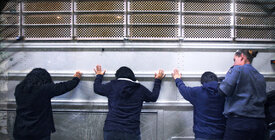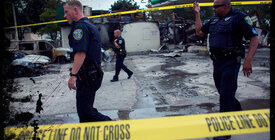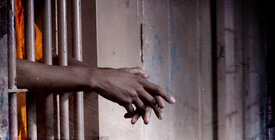
A Holistic Approach to Legal Advocacy
For poor, persecuted communities, helping them overcome legal challenges isn’t nearly enough.

Part of
This essay is part of the Brennan Center’s series examining the punitive excess that has come to define America’s criminal legal system.
On a spring afternoon in 2014, a husband and wife left a local community center in St. Louis County, Missouri, to return home to their seven children. Within seconds, they were stopped by a police squad car. When officers approached the vehicle, they went to the passenger’s side and asked the husband for his name, claiming that there had been a recent report about someone who matched his description. Despite his assurances that he was not the man in question, the husband was asked to step out of the car and was placed under arrest moments later. (He was, indeed, never charged with any of the wrongdoing that formed the pretext for the stop.) When his wife stepped out of the car in protest, she, too, was placed under arrest.
The couple was taken to a local jail, placed in filthy, overcrowded cells, and given bonds of $2,000 each. They would both remain in jail for a month, unable to post bail and not once appearing before a judge. While incarcerated, their children were uprooted from their home and taken into the care of multiple relatives. Eventually, exhausted and desperate, they both agreed to plead guilty to a series of municipal charges in exchange for their release. They would still be responsible, they were told, for paying nearly $2,000 each, this time as fines and fees for their supposed offenses.
I met this husband and wife more than a year later, in my very first month as a Skadden Fellow and staff attorney with ArchCity Defenders, a legal advocacy organization in St. Louis. When I met them, their memories from that harrowing month were still fresh. They had lost a full month of earnings for their household, placing them and their entire family under even more dire financial strain than they already had to bear as a large family with inconsistent sources of income. They were struggling to pay rent and utilities, care for their children, and find more stable employment.
But despite all of that, their reason for coming to us was that they were still paying hundreds of dollars per month to the local municipal court that had overseen their jailing. The so-called “pay docket” was approaching. At these monthly dockets, they were expected to make payments of $100 each on their debts, and they could not keep up.
There are several elements of this story that are particularly egregious, but the basic dynamics — people who are living perilously on the margins being targeted and exploited by the criminal legal system — are, in fact, not at all unusual. Susan Butler Plum, the founding director of the Skadden Fellowship Foundation, which places new lawyers in public interest positions across the country, has often underscored the significance of anti-poverty legal work by positing, “My definition of poverty is that each thing compounds the next thing.”
It is a definition that has returned to my mind many times during my work at ArchCity Defenders. Traffic tickets, court debts, criminal charges, jail, bail, eviction, child support, custody, consumer abuse, homelessness: our clients do not experience these traumatic challenges one at a time — they experience many, all at once or in rapid succession.
When we know that our field is characterized by systematic underfunding of indigent defense, when 90 percent or more of tenants faced with eviction proceedings must defend themselves without counsel, and when there’s a complete dearth of free (or even affordable) legal services for a range of needs, from family law to consumer protection to public benefits claims – when we know all this, how can we possibly justify a system in which the overwhelming majority of people subjected to archaic legal processes are left to navigate those processes with no support whatsoever? How can we stomach a system that does little more than further traumatize, destabilize, and extract from the very people who already have the least? And what can we do differently in the face of entrenched support for the status quo and resistance to structural change?
At ArchCity Defenders (ACD), we describe ourselves as a holistic legal advocacy organization. We are an independent, nonprofit civil rights and legal aid organization with a staff of 30 people — about half of them attorneys and the other half a mix of social workers, paralegals, communications professionals, fundraisers, operations specialists, and organizers. ACD was founded to fill a gap in legal services in the St. Louis region, and even with the significant growth of our team over the past 12 years, that gap continues to exceed by far the scale of services that we can provide. In part for this reason, the word “holistic” is central to who we are, how we understand the world and the system in which we are embedded, and why we believe that traditional legal practice has only deepened some of the most fundamental injustices in this country.
For us, this word also takes on a dual meaning in our daily practice.
On one level, we provide holistic defense and legal representation in our work with individual clients. This type of holistic defense is based upon the model developed and popularized by the Bronx Defenders. Instead of defining our individual services by discrete areas of legal practice, our holistic direct services consist of criminal or municipal defense; civil legal representation for evictions, social security/disability and similar public benefits claims, child support, custody, and other family law matters; and wraparound social support in the form of rehousing services and case management, emergency rental and utility assistance, and supportive referrals to a vast network of social service and treatment providers.
Understanding that the challenges facing our clients are complex and intersecting, our goal is to support people in ways that reflect the reality of their lives. Sometimes, this is as simple as listening to clients and believing what they say about the most pressing issues they are facing, instead of substituting our judgment for theirs. We can only be effective in our work if we develop trusting relationships with our clients, and that requires that we respect them as the experts on their own lives.
The other element of our holistic advocacy is an emphasis on engaging at the systems level as well as the individual level. Over time, we have developed four pillars in our model: holistic direct services (described above), impact civil rights litigation, media and policy advocacy, and community collaboration. If our holistic direct services focus on providing a range of support to clients as they navigate oppressive systems, the other pillars focus on exposing, combating, and dismantling those very systems. In the face of such pervasive injustice, an effective defense is critical, but a strategic offense is equally essential.
Our individual client representation forms the foundation of the fights that we undertake through affirmative civil rights litigation. These cases, often but not always class actions, challenge abusive policing, debtors’ prisons, cash bail, unfair housing practices, and a range of practices that criminalize poverty and homelessness. Through litigation, we seek not only policy transformation, but also monetary compensation for our clients and others similarly harmed. Again, we know from our clients that this is a priority.
Our media and policy advocacy with and on behalf of our clients extends far beyond the courts. Having our clients and their families tell their stories fully and honestly is the most powerful mechanism for raising awareness and sparking action, both by policymakers and everyday people. Whether through traditional media, social media, or other creative storytelling means, our aim is to replace the many dehumanizing tropes about our clients with nuanced representations that honor the truth of their experiences. We also seek opportunities to connect these experiences to policy in the form of reports, white papers, open letters, and accessible, illustrated “know your rights” guides.
Lastly, the efforts aimed at the most lasting and long-term change are those taken in collaboration with partners, clients, and other community members to transform our systems and reimagine what is possible. Ultimately, organized community is the only sustainable means of achieving the change we seek. Eradicating poverty and defeating white supremacy are political projects. They will not be won in the courts. So, if we are committed to faithfully serving our clients and pursuing our mission, we must shed the tired fallacies of “neutrality” and “objectivity” and be fully in the fight for our collective liberation. That means supporting the work of organizing campaigns, building coalitions, and shifting power to those we serve.
For people like the couple I described at the beginning of this essay, there are rarely fairy-tale endings. Even after resolving the immediate legal issue and successfully fighting back against the city — receiving significant monetary damages for the harm they suffered and securing policy changes preventing the use of secured cash bail to hold anyone in jail on municipal charges — they have continued to face challenges with housing, employment, policing, and even school access for their children during periods of housing instability.
I will never forget one afternoon when I picked this couple up from their home in Black, low-income North St. Louis City to prepare for a court appearance. As we rode down a main thoroughfare lined with closed, boarded-up businesses and check-cashing shops, the husband remarked, almost to no one, “When they start the concentration camps, they’re coming here first.”
His wife, sitting behind him, narrowed her eyes and looked at him. “What are you talking about?” she asked incredulously. “They’ve already got concentration camps. We’re living in concentration camps.”
I share this not for shock value or as political commentary. Whether or not you believe the metaphor to be apt is irrelevant. The point is that poor, Black and brown, hyper-criminalized, and underserved communities across the country understand the immensity of the challenges stacked against them. The only way for us to be of any use as lawyers and advocates is to understand the same, and to marshal every tool at our disposal at every turn. Those we serve deserve nothing less.
Blake Strode is the executive director of ArchCity Defenders.
More from the Punitive Excess series
-
Surviving a Daily Storm
A formerly incarcerated writer reflects on her time behind bars and the gender disparities in the criminal justice system. -
Addressing Violent Crime More Effectively
Excessive punishment is the wrong response to rises in homicide rates. -
End Mandatory Minimums
Inflexible, harsh sentences exacerbate crime and racial disparities alike.



